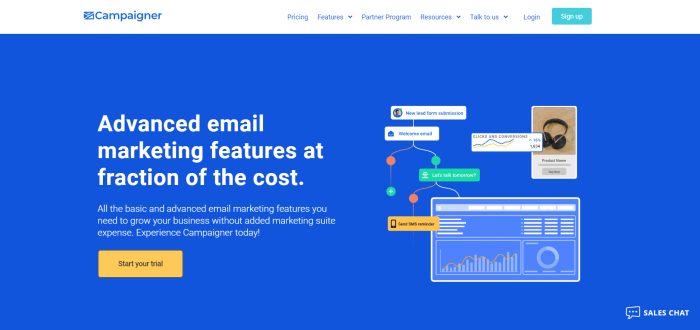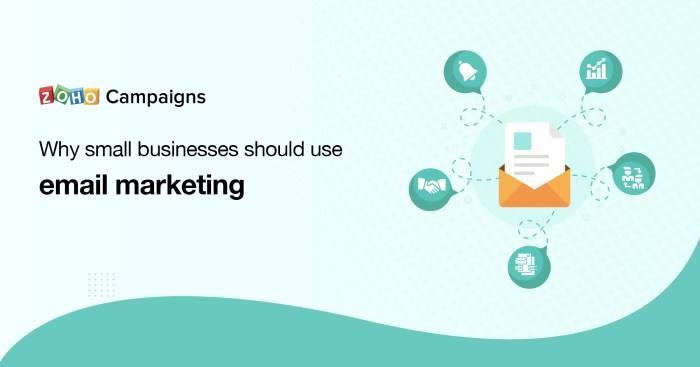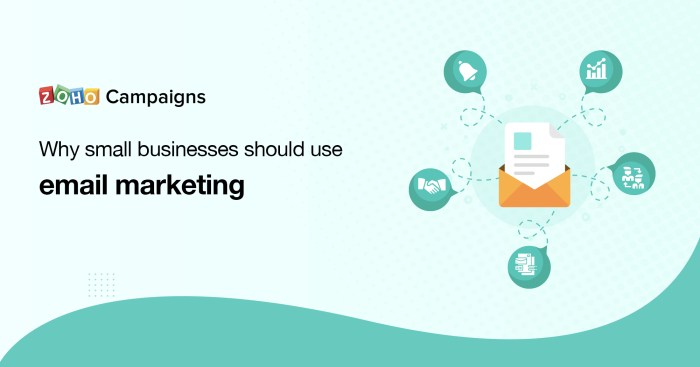Email marketing for local business is a powerful tool for connecting with customers and driving sales. It allows businesses to directly reach their target audience with personalized messages, build relationships, and foster loyalty. This guide will explore the essentials of email marketing, from building an effective list to crafting compelling campaigns and optimizing results. Learn how to leverage email to enhance your local business’s visibility and success.
We’ll cover everything from understanding the importance of email marketing for local businesses to strategies for building a thriving email list. We’ll also explore crafting compelling email campaigns, optimizing them for success, and integrating them seamlessly with other marketing channels. Finally, we’ll discuss the legal and ethical considerations of email marketing, ensuring you’re operating with best practices.
Introduction to Email Marketing for Local Businesses

Email marketing is a powerful tool for local businesses to connect with customers and drive sales. It allows businesses to directly communicate with their audience, build relationships, and nurture leads. In a competitive local market, a well-executed email strategy can be a game-changer, helping you stand out from the crowd and increase your visibility.Email marketing offers a cost-effective way to reach a large audience compared to traditional advertising methods like print or radio.
It’s highly customizable, allowing businesses to tailor messages to specific customer segments, interests, and behaviors. This targeted approach often leads to higher conversion rates and a stronger return on investment.
Benefits of Email Marketing for Local Businesses
Email marketing offers several advantages over other marketing methods for local businesses. Direct communication with customers fosters loyalty and trust, building stronger relationships than impersonal advertisements. The ability to personalize messages increases engagement and encourages customer interaction, ultimately leading to more sales and repeat business. Email allows for detailed tracking and analysis of campaign performance, providing actionable insights to optimize future strategies.
Successful Email Marketing Campaigns by Local Businesses
Many local businesses have successfully utilized email marketing to grow their customer base and revenue. For example, a local bakery used email to announce daily specials, highlight seasonal offerings, and share behind-the-scenes glimpses of their operation. This strategy generated significant buzz and drove customers to visit their store, increasing sales. Similarly, a local florist utilized email to promote special events and exclusive offers to subscribers, fostering a loyal customer base.
These campaigns demonstrate the effectiveness of personalized email marketing in generating customer interest and driving business growth.
Email marketing is a game-changer for local businesses, but you need a solid online presence. If you’re seeing issues with your website’s redirects, fixing them through Google Search Console, like in google search console how to fix page with redirect , will dramatically impact your email marketing success. A well-optimized site ensures your email campaigns are delivered to the right audience, leading to more engagement and conversions.
Comparison of Email Marketing Platforms, Email marketing for local business
Choosing the right email marketing platform is crucial for a successful campaign. Different platforms offer varying features, pricing models, and support. The following table compares popular options suitable for local businesses:
| Feature | Mailchimp | Constant Contact | Sendinblue |
|---|---|---|---|
| Ease of Use | High; user-friendly interface | High; intuitive design | High; straightforward platform |
| Pricing | Free tier available; various paid plans | Free tier available; various paid plans | Free tier available; various paid plans |
| Features | Excellent segmentation, automation, and reporting tools | Good segmentation and automation tools; strong focus on small businesses | Strong automation, segmentation, and marketing automation tools; affordable pricing |
| Support | Comprehensive online resources and customer support | Good online resources and customer support | Helpful online resources and customer support |
This table provides a general overview; specific features and pricing may vary. It’s essential to evaluate the platform’s capabilities, consider your business needs, and choose the one that best aligns with your budget and objectives. For example, a small business with limited resources might benefit from a free tier or an affordable paid plan. Conversely, a larger business with more complex needs may require a platform with advanced features and dedicated support.
Building an Email List for Local Businesses

Growing an email list is crucial for local businesses to foster customer relationships, drive repeat business, and ultimately, boost revenue. A strong email list allows for direct communication, personalized offers, and targeted promotions, which can significantly impact a business’s bottom line. It’s more than just a collection of addresses; it’s a valuable asset that, when managed correctly, can be a powerful engine for growth.Effective email list building isn’t a one-time task; it’s an ongoing process that requires strategic planning and consistent effort.
Businesses need to attract customers to subscribe, and more importantly, retain those subscribers through valuable content and engaging communications. This approach fosters loyalty and positions the business as a trusted source of information and offers.
Strategies for Growing an Email List
Attracting customers to subscribe to an email list requires thoughtful strategies. Offering exclusive deals or early access to new products and services are compelling incentives. Providing valuable content, such as recipes, tips, or local event information, can also attract subscribers. Remember, it’s not just about collecting addresses; it’s about building relationships.
Methods for Capturing Email Addresses
Implementing various methods for capturing email addresses across multiple touchpoints is essential for effective list building. This strategy ensures a consistent message and creates a seamless customer experience. Different methods can be employed, depending on the specific business and customer base.
- Website Pop-ups: Strategic website pop-ups, offering incentives like discounts or free resources, can be highly effective in prompting sign-ups. These should be unobtrusive, but clearly communicate the value proposition of subscribing. Examples include a discount code for the first purchase or a free downloadable guide. Pop-ups should be designed to maximize conversions without overwhelming the user experience.
- In-Store Sign-ups: In-store sign-ups can be a valuable source of leads. Consider offering a small discount for signing up or a free item in exchange for an email address. A simple, clear sign-up sheet or a dedicated kiosk can encourage immediate subscriptions. Consider a visually appealing display, and ensure the signup process is quick and easy.
- Loyalty Programs: Loyalty programs can incentivize customers to provide their email addresses. Offering exclusive discounts or early access to new products and services to loyal customers will motivate them to join. A well-designed loyalty program can turn customers into advocates for your business, leading to more sign-ups and increased customer lifetime value.
Example Signup Form for a Local Bakery
A well-designed signup form is key to attracting customers and encouraging subscriptions. The following form is designed for a local bakery, showcasing clear instructions and attractive design.
| Field | Description |
|---|---|
| Email Address | Required field for communication. |
| First Name | Optional, but enhances personalization. |
| Subscribe to Newsletter | Indicates the user’s intent to receive communications. |
| Submit Button | Actionable button to complete the sign-up process. |
Example Form:
Email Address:
First Name:
Subscribe to Newsletter:
Email marketing is a powerful tool for local businesses, but you need to complement it with other strategies. For instance, understanding the importance of owning your own Google Ads account the importance of owning your own google ads account is crucial for targeted advertising. This will ensure your emails are reaching the right customers, leading to higher conversion rates and ultimately, more business.
Ultimately, email marketing, combined with smart online strategies, helps your local business thrive.
Email Marketing Best Practices for Collecting Customer Data
Collecting customer data ethically and responsibly is essential for building trust and complying with privacy regulations. These best practices are vital to ensure data protection and avoid potential legal issues.
- Transparency: Clearly communicate to customers how their data will be used. This includes stating the purpose of the email list, outlining the types of communications they can expect, and specifying the frequency of these communications.
- Consent: Obtain explicit consent from customers before collecting their email addresses. This ensures that customers are aware of how their data will be used and that they have voluntarily agreed to provide their information.
- Data Security: Implement robust security measures to protect customer data from unauthorized access, use, or disclosure. This includes using strong passwords, encrypting data, and regularly reviewing security protocols.
- Compliance: Ensure compliance with all applicable data privacy regulations, such as GDPR or CCPA, to avoid potential penalties. This involves understanding the specific regulations that apply to your business and implementing appropriate measures to comply with them.
Crafting Effective Email Campaigns for Local Businesses
Email marketing is a powerful tool for local businesses to connect with their customers, build relationships, and drive sales. Crafting compelling email campaigns goes beyond simply sending out newsletters; it requires a strategic approach that considers your target audience, their needs, and your business goals. Effective campaigns translate to increased engagement, brand loyalty, and ultimately, more revenue.A well-executed email campaign can nurture leads, promote special offers, and build brand awareness within your local community.
By understanding your customers’ preferences and tailoring your messages accordingly, you can significantly improve the effectiveness of your email marketing efforts.
Compelling Email Subject Lines
Crafting attention-grabbing subject lines is crucial for maximizing open rates. Generic or vague subject lines often get lost in the inbox clutter. A compelling subject line clearly communicates the value proposition of the email and encourages recipients to open it.Examples of effective subject lines for local businesses include:* “Special Offer: [Discount Percentage] Off Your Next Service!”
“Local Event
[Event Name] This Saturday!”
- “[Business Name]
- Expert Advice on [Local Issue]”
“Limited Time Offer
Free [Service] with Purchase!”
Email Content that Resonates with Local Customers
Email content should focus on the local customer. Personalization and relevance are key to making your emails stand out and feel valuable.Consider incorporating these elements into your email content:
- Local events and happenings: Highlight community events you sponsor or participate in. Sharing local news or interesting happenings demonstrates your engagement with the local area and builds trust.
- Community testimonials: Showcase positive reviews and feedback from satisfied local customers. Social proof is a powerful tool for building credibility and trust.
- Neighborhood-specific promotions: Tailor promotions to specific neighborhoods or demographics. For instance, a coffee shop might offer a discount to residents of a particular neighborhood.
- Local partnerships: Collaborate with other local businesses and promote their services or products within your emails. This can introduce your business to a wider audience and create cross-promotional opportunities.
Email List Segmentation
Segmentation is essential for delivering targeted messages to specific groups within your email list. It allows you to personalize the content based on factors like location, purchase history, and engagement levels. This leads to higher open rates, click-through rates, and ultimately, more conversions.For example, a local florist could segment their list based on flower preferences, special occasions, or past purchases.
This allows them to send tailored emails with relevant promotions and recommendations.
| Segment | Example Email Content |
|---|---|
| Customers who purchased bouquets last month | “Special Offer: 15% off your next bouquet order” |
| Customers interested in wedding flowers | “Expert advice on choosing the perfect wedding flowers” |
| Customers living in a specific neighborhood | “Local event: [Event name] at [location]” |
Personalization in Emails
Personalization enhances the recipient’s experience and builds stronger relationships. Addressing recipients by name and referencing past interactions are simple yet effective ways to personalize your emails.Using dynamic content based on customer data helps deliver highly personalized emails. This could include customized product recommendations, tailored promotions, or specific messages based on past purchases or preferences. By using recipient data to craft relevant and targeted emails, businesses can increase engagement and conversion rates.
Optimizing Email Campaigns for Local Businesses
Email marketing is a powerful tool for local businesses, but its effectiveness hinges on how well campaigns are optimized. Understanding how to measure success, track key metrics, and choose the right tools is crucial for maximizing return on investment (ROI) and driving tangible results. This section will delve into these strategies, enabling local businesses to fine-tune their email marketing efforts and achieve greater impact.A well-optimized email campaign isn’t just about sending emails; it’s about creating a targeted and engaging communication strategy that resonates with your audience.
This requires a deep understanding of your customers, their needs, and how email fits into their overall experience with your business. Careful attention to detail and ongoing analysis are key to success.
Measuring Email Campaign Success
Effective email campaigns are not a one-and-done effort. They require consistent monitoring and analysis to identify areas for improvement. Key metrics offer valuable insights into campaign performance, allowing businesses to adapt their strategies and maximize impact.
Key Metrics to Track
Understanding the key metrics of your email campaigns is essential for gauging their effectiveness. These metrics provide a clear picture of what’s working and what needs adjustment.
- Open Rates: Open rates indicate the percentage of recipients who opened your email. High open rates suggest your subject lines are compelling and your email content is relevant to the recipient. Low open rates may indicate issues with your subject lines, the sender reputation, or the overall email relevance.
- Click-Through Rates (CTR): CTR measures the percentage of recipients who clicked on a link within your email. A high CTR signifies that your email content is engaging and that the links are relevant to your audience’s interests. Low CTRs might signal that your call-to-action (CTA) is unclear, the content is irrelevant, or the design is unappealing.
- Conversion Rates: Conversion rates represent the percentage of recipients who completed a desired action after clicking a link. This could be making a purchase, scheduling an appointment, or visiting your website. High conversion rates indicate that your email campaigns are effectively driving desired outcomes.
- Bounce Rates: Bounce rates represent the percentage of emails that were unable to be delivered to the intended recipient. High bounce rates can be attributed to incorrect email addresses or full inboxes, and can be a signal that your email list is not maintained properly. Regular list maintenance and email verification strategies are essential.
- Unsubscribe Rates: Unsubscribe rates reflect the percentage of recipients who opted out of receiving future emails. High unsubscribe rates may indicate that your emails are not valuable to the recipient, that they are too frequent, or that the content is irrelevant.
Email Marketing Tools for Analysis
Several tools are available to help local businesses analyze their email campaign performance. These tools offer various features, including tracking metrics, segmenting audiences, and optimizing email design.
- Mailchimp: A popular email marketing platform offering a comprehensive suite of tools for managing email campaigns, including analytics and reporting features.
- Constant Contact: Another widely used platform with robust features for analyzing email campaign performance. It provides in-depth reports and insights, allowing businesses to understand recipient engagement and optimize campaigns for better results.
- ConvertKit: Designed for creators and businesses looking to build email lists and nurture subscribers, ConvertKit offers detailed email marketing analytics and reporting. This platform is particularly suitable for businesses focusing on content marketing and building a strong online presence.
Strategies for Improving Email Deliverability
Email deliverability refers to the ability of your emails to reach the recipient’s inbox. Maintaining a high deliverability rate is essential for maximizing campaign effectiveness.
- Building a High-Quality Email List: Acquiring email addresses through legitimate means, such as opt-ins, is crucial. Avoid purchasing email lists, as this can significantly impact deliverability.
- Regular List Maintenance: Regularly removing inactive or invalid email addresses from your list is essential for maintaining a healthy list and preventing issues with deliverability.
- Using a Reputable Email Service Provider (ESP): Opting for a reputable ESP helps ensure your emails are delivered to inboxes rather than spam folders. Their infrastructure is often designed to avoid issues.
- Monitoring Sender Reputation: Regularly check your sender reputation. A good sender reputation will lead to higher deliverability rates.
Integrating Email Marketing with Other Marketing Channels for Local Businesses: Email Marketing For Local Business
Email marketing isn’t a standalone effort. Its true power lies in its ability to amplify your overall marketing strategy. By seamlessly integrating email with other channels like social media, in-store promotions, and , you create a unified, multi-faceted approach that resonates with your target audience. This holistic strategy increases brand visibility, drives traffic, and ultimately boosts sales for your local business.Local businesses often face the challenge of reaching and retaining customers in a competitive environment.
Email marketing, when strategically combined with other channels, can overcome these hurdles and effectively connect with customers on multiple fronts. This interconnected approach allows for consistent messaging and a more comprehensive customer experience.
Integrating Email Marketing with Social Media
Email marketing and social media are powerful partners. Social media platforms act as powerful amplifiers for your email marketing efforts. Share enticing snippets of upcoming email content on social media, prompting engagement and encouraging subscribers to open your emails. Consider running contests or giveaways on social media, with email sign-ups as an entry requirement. This tactic effectively builds your email list while increasing social media engagement.
Promote your social media presence in your email newsletters. Include links to your social media pages and encourage followers to interact with your business on those platforms. This can lead to increased visibility and a wider reach for your local business.
Using Email Marketing to Promote In-Store Events or Offers
Email marketing is a fantastic tool for promoting special events or offers within your physical store. Use your email list to announce exclusive in-store promotions, discounts, and events. Encourage subscribers to visit your store by highlighting the value proposition of these in-store experiences. For instance, a restaurant could use email to advertise a special menu item or a wine tasting event.
Include high-quality images or videos showcasing the event’s atmosphere, further enticing customers to attend. Clearly state the date, time, and location of the event or promotion in your email.
Integrating Email Marketing with Local Efforts
Email marketing can significantly support your local strategy. Include relevant s in your email subject lines and content. This practice can improve your email’s visibility in search results. Promote your local business’s presence on local search platforms, encouraging customers to review your business and leave feedback. Use the feedback in your email marketing.
For example, a local bakery could feature positive customer reviews in their newsletter, building trust and credibility. In addition, ensure your email signature includes relevant contact information, such as your address and phone number, which is vital for local .
Complete Marketing Strategy for a Local Restaurant
| Marketing Channel | Strategy | Email Marketing Component |
|---|---|---|
| Social Media | Run contests, giveaways, and behind-the-scenes content | Promote contests and giveaways; include links to social media profiles in emails. |
| In-Store Promotions | Offer exclusive discounts and menus | Announce special menus, discounts, and events in advance via email. |
| Local | Claim local listings, build citations, and gather reviews | Encourage reviews; highlight positive customer reviews in newsletters. |
| Email Marketing | Build an email list, create a newsletter, and personalize emails | Send weekly newsletters with restaurant specials, upcoming events, and customer appreciation offers. |
Legal and Ethical Considerations in Email Marketing for Local Businesses
Email marketing can be a powerful tool for local businesses to connect with customers and drive sales. However, it’s crucial to understand and adhere to the legal and ethical guidelines surrounding email communications. Ignoring these considerations can lead to penalties, damage your reputation, and ultimately harm your business. This section dives deep into the essential legal and ethical aspects of email marketing for local businesses.Understanding email marketing regulations and ethical practices is paramount for maintaining a positive relationship with your customer base and avoiding potential legal issues.
These considerations ensure your email campaigns are compliant and trustworthy, building a strong foundation for your business’s success.
Complying with Email Marketing Regulations
Email marketing regulations, such as CAN-SPAM, are designed to protect consumers from unwanted or misleading emails. Compliance is vital for maintaining a positive customer relationship and avoiding legal repercussions.
Email marketing is a game-changer for local businesses. To really make it shine, you need a solid plan, and that starts with a great editorial calendar. Learning how to make one is crucial for crafting engaging emails that resonate with your audience. Check out this helpful guide for creating an effective editorial calendar: how to make an editorial calendar.
Once you’ve got that down, you’ll be able to send out targeted, timely emails that boost your business’s visibility and drive those all-important sales.
- CAN-SPAM Act: The CAN-SPAM Act requires businesses to obtain explicit consent before sending commercial emails. It also mandates clear labeling of the email’s commercial nature, accurate header information, and a clear way for recipients to unsubscribe. Failure to comply can result in significant fines and damage to your brand reputation. For example, a local bakery that sends unsolicited promotional emails without a clear unsubscribe option could face legal action and reputational harm.
- Data Protection Laws: In addition to CAN-SPAM, local businesses must consider data protection laws like GDPR (in regions where it applies). These regulations focus on the collection, storage, and use of customer data. Understanding and complying with these laws is crucial to ensure you are handling customer information ethically and legally.
Ethical Implications of Collecting and Using Customer Data
Ethical considerations are vital when collecting and utilizing customer data for email marketing. Building trust with your audience is paramount, and this involves transparency and respect for their privacy.
- Transparency: Be transparent about how you collect and use customer data. Clearly Artikel your data practices in your privacy policy and obtain explicit consent before using customer information for email marketing purposes. This includes being upfront about what types of data you collect, how it will be used, and who might have access to it.
- Respect for Privacy: Respect your customers’ privacy by not collecting unnecessary data or using their information for purposes beyond the scope of your stated intent. Avoid overly aggressive or intrusive email marketing strategies that might make customers feel uncomfortable or unwelcome. For example, a local florist shouldn’t collect sensitive data, like financial information, if it’s not essential for their services.
- Data Security: Protect customer data from unauthorized access, use, disclosure, alteration, or destruction. Implement appropriate security measures to safeguard customer information, as breaches can lead to legal liabilities and reputational damage.
Best Practices for Handling Unsubscribe Requests
A clear and effective unsubscribe process is essential for maintaining a positive relationship with customers.
- Prompt Action: Respond to unsubscribe requests promptly and accurately. Provide a clear and straightforward way for customers to opt out of receiving further emails.
- Simple Process: Make the unsubscribe process simple and accessible. Ensure the unsubscribe link is prominent and easy to find within the email.
- Verification: Consider implementing a verification step for unsubscribe requests to prevent accidental unsubscribing or abuse of the system. For example, a local yoga studio could ask users to re-enter their email address to confirm their desire to unsubscribe.
Requirements for Obtaining Explicit Consent for Email Marketing
Explicit consent is crucial for legally and ethically conducting email marketing campaigns.
- Clear and Concise Opt-in: Ensure your opt-in process is clear, concise, and easily understood. Provide users with a clear understanding of how their data will be used and what they’re agreeing to.
- Multiple Opt-in Methods: Offer various opt-in methods, like separate boxes or dedicated pages, to ensure customers clearly understand the implications of providing their email address. A local bookstore could offer a checkbox alongside a newsletter signup form or a dedicated landing page with a signup button.
- Opt-out Options: Always include a clear and easily accessible opt-out mechanism in your emails. A local coffee shop should have an easily visible link for customers to unsubscribe from their email list.
Case Studies of Successful Email Marketing for Local Businesses
Email marketing isn’t just for large corporations; local businesses can leverage its power to connect with customers, build loyalty, and drive sales. Successful campaigns often demonstrate a deep understanding of the target audience, compelling messaging, and strategic use of email automation. These real-world examples offer valuable insights into how local businesses can maximize their email marketing efforts.Effective email campaigns are not just about sending out newsletters; they are a vital component of a well-rounded marketing strategy.
By understanding the needs and preferences of their target audience, local businesses can tailor their emails to provide value and build meaningful relationships. This often involves segmenting the audience and personalizing messages to resonate with individual customer preferences.
Restaurant Email Marketing Successes
Restaurant owners can use email to build anticipation and drive traffic. Regularly scheduled emails announcing new menu items, special offers, or upcoming events can significantly boost foot traffic and online orders. Special offers, like a discount for a first-time online order or a loyalty program, can incentivize repeat customers. Email campaigns also enable restaurants to share customer testimonials and photos of delicious dishes, fostering a sense of community and trust.
These strategies create a compelling reason for customers to visit the restaurant or place an order online.
Local Florist: Building Loyalty Through Exclusive Offers
A local florist can utilize email to cultivate customer loyalty. The florist could send out exclusive offers to subscribers, such as a discount for a birthday arrangement or a special discount for wedding bouquets. These offers, combined with seasonal promotions, can encourage repeat business. These offers, coupled with beautiful images of the flowers, help showcase the artistry and quality of the florist’s work.
Emails could also feature heartwarming customer stories, further solidifying the connection with the local community.
Local Fitness Studio: Driving Engagement and Scheduling
A local fitness studio can effectively leverage email to promote their classes and encourage engagement. They can send out reminders about upcoming classes, share testimonials from satisfied customers, or offer exclusive discounts for new members. Email can be used to manage scheduling, send reminders for appointments, and promote special events. These emails should contain clear calls to action, such as links to online class registration or appointment booking.
Visuals of happy clients participating in activities can boost the appeal of the studio and inspire potential clients.
Local Grocery Store: Maintaining Customer Engagement
Local grocery stores can use email to keep customers informed about new products, seasonal specials, and in-store events. These emails can also include valuable information, like recipes that use the store’s ingredients, or highlight weekly deals and promotions. Regular email communication builds anticipation and encourages customers to visit the store. The emails can showcase fresh produce or highlight the store’s commitment to local suppliers, connecting with customers on a deeper level.
A weekly newsletter with featured items and deals can enhance customer engagement and keep them informed about the latest offerings.
Key Elements Contributing to Campaign Success
Successful email campaigns share several common threads:
- Compelling Subject Lines: Intriguing subject lines are crucial for encouraging recipients to open the email.
- Personalization: Tailoring content to individual customer preferences enhances engagement and fosters a sense of connection.
- Clear Call-to-Action: Simple, clear calls to action make it easy for customers to take the desired action, such as making a purchase or visiting the store.
- Visual Appeal: Visually engaging content, such as high-quality images or videos, can enhance the overall experience and make the email more memorable.
These elements contribute to the effectiveness of email campaigns, driving customer engagement and achieving business objectives. Focusing on personalization and clear calls to action significantly improves campaign performance.
Last Recap
In conclusion, email marketing for local businesses is a dynamic and effective approach to achieving marketing objectives. By understanding the key strategies and best practices Artikeld in this guide, local businesses can harness the power of email to cultivate customer relationships, boost sales, and achieve long-term success. Implementing the techniques shared here will allow you to connect with your audience in a personalized way, fostering loyalty and driving meaningful results.
Remember, consistent effort and a customer-centric approach are key to maximizing your email marketing impact.






